Words by Lula Criado
My first exposure to Elson Kambalu’s work was at the exhibition Foreign Bodies, Common Ground displayed at the Wellcome Collection in London. Malawi-based artist Elson Kambalu uses art as a tool to blur the boundaries between scientific processes and local communities.
Kambalu’s approach to art is conceptual and participatory. He loves listening to people’s stories, “I am interested in listening to their stories and driven by a curiosity about what the future might bring” he says.
Working and interacting with medical scientists, musicians, community workers and urban and rural people, Elson Kambalu explores the major issues —blood and superstitions, literacy levels, poverty, culture level, consent and gender and language barriers— that affect medical research in Malawi.
Kambalu makes poetic and intimate pieces of art that represent a bridge between traditional and modern medicine and helps understand the importance of scientific and health research in Malawi.
What is more important: to take or not to take yourself too seriously in order to be creative?
I am not a very patient person and so I have to find ways of glueing myself to a particular task without feeling bored. One of the ways is by being ‘playful’. That’s when I am most creative. Creating visual works is not like theatre.
You are not acting a part. To me, creating works of art is a way of life, and who on earth wants a stiff ‘serious’ life? I am usually not very private about what I have set out to create. I draw inspiration from the many conversations I hold with those around me as I create.
I am not talking about experts, here. I am talking about ordinary people getting about their own business but taking off a few minutes of their time to talk over whatever I am creating. Such interaction helps me perfect my work. I draw inspiration from their responses.
I keep my approaches to art, very simple. I have never really liked formalities. I rather find them a hindrance to freedom, to one’s creativity. To me, taking oneself seriously is about confinement, the complete opposite of creativity which is supposed to be a free-spirited affair…..
What’s your favourite time of the day?
I have always been an early riser. Sleep has always haunted me. And so I have always welcomed the wee hours of the morning with gratitude. That’s my favourite time of the day, just before everyone else has woken up from their slumber. I find myself more powerful as I gather my thoughts.
Seeing people asleep as I work on my concepts constantly assures me of how vulnerable humanity is. Isn’t it fascinating to note that even the most powerful people on earth succumb to sleep, where they are at their most helpless? There is an assurance in that- that we are all humans capable of rising to greater heights in our weaknesses.
There is something about early mornings- a freshness, something virgin and pure. I like polishing my arsenals at that hour. I have always looked at sleep suspiciously. Sometimes sleep looks like a time waster. I like the idea of being ahead, and so the mornings provide that opportunity to go the extra mile when everybody else is busy observing this bodily ritual called sleep…
Solitude or loneliness, how do you spend your time alone?
I am constantly alone regardless of who is around me. I don’t have to be physically alone to create such space. I am constantly inside my mental faculties, no matter how loud the noise. I have always enjoyed and found comfort in my thoughts. I am constantly conversing with myself and I am very much aware of my presence in the lives of other people. Sometimes I think I can hear myself talking.
The mornings obviously provide such quality time when am either contemplating, bathing, or taking a walk to my workplace. Walking through uncharted spaces where everyone is a stranger provides that special time as well. ….
Have you found beauty in unexpected places/situations?
I appreciate nature and so it is easy for me to appreciate the beauty in unexpected places. I have found beauty in the sound of mourners at a funeral. I found beauty in the voice of a catholic priest presiding over a funeral. I have found beauty in people drenched wet in the heavy downpour. There was a time I saw beauty in a dug-out canoe which had a yellow patch that created a reflection on the lake’s surface.
The beauty of hearing people conversing in a language that you do not understand. I have found beauty in some of the most impoverished areas in my country. I have seen beauty in some of the women in the rural areas of my country, who will never know how beautiful they are because their society has never recognised such type of beauty.
What do you want to achieve before you die?
I would really like to leave a legacy that secures the lives of my offspring and the children of Malawi. A name that will enable them to pass through all kinds of doors because their father fought a battle for them and won. A voice that will still speak from the grave, a role model to look up to for inspiration.
I would like that name to be imprinted on the minds of generations to come because I chose to make a difference.I don’t want them ever to experience the harshness of poverty and the failure to access opportunities as I experienced when I was growing up. I want to be the last man in the poverty cycle…….
One for the road… What are you unafraid of?
I am not afraid of oppressors. I am not afraid of speaking out my views when I encounter oppression or abuse. Much more specifically, anything to do with suppressing artists’ rights and heritage. I am quick to react. I am suddenly filled with vigour to defend what is right. I believe in fairness and compassion….. I am unafraid of cowards….











